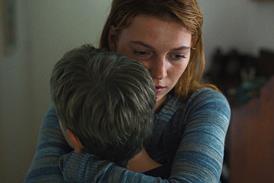Dir:Philippe Garrel. Fr. 2005. 183mins
French director PhilippeGarrel makes unclassifiable movies that play to highly discerning tastes. Hisexquisite new feature, The Regular Lovers, a three-hour black-and-whitemeditation on love, passion and the personal and political ramifications of theevents of May 1968, is a strikingly original and challenging piece of work.
Even with its Venice bestdirector prize it is unlikely to expand Garrel's cult following or change hisdetractors' negative opinions about his work. The very qualities that render itso commercially restrictive also underline its aesthetic revelations.
Most of the director's workis strongly autobiographical. In The Regular Lovers, he makes thepersonal implications explicit by casting his son, Louis Garrel, as Francois, apoet, which deftly echoes a role Louis played in Bernardo Bertolucci's recent TheDreamers. The director's father Maurice Garrel (Kings And Queen)contributes a startling, seemingly improved sequence, and he strategically usesa song by Nico, of the Velvet Underground and his former wife.
Constructed in three majormovements, the movie functions as a summation of Garrel's stylistic andnarrative concerns. His early experimental films were highly influenced byGerman expressionism and silent cinema, and the opening section beginsfantastically with a virtuoso 30-minute sequence of Francois and his friendsparticipating in the ferocious street battles with French security authoritiesin May 1968, strikingly staged against a charred landscape of fire-engulfedcars, social disruption and human partitions.
The middle sequences arelooser and more relaxed, given a musical flow with Francois and his friendsseeking escape by partying, dancing, smoking opium and hanging out withbeautiful women in the vast Left Bank apartment inherited by his friend Antoine(Julien Lucas).
One night Francois makes aconnection with Lilie (Hesme), a beautiful, gifted sculptor who supportsherself as a factory worker, and they quickly initiate a relationship. Lilie isclearly attracted to Francois, though she is also restless and anxious fordifferent experiences, and her sexual experimentation with other partners andher developing friendship with an older art patron and mentor sharply impactstheir future together.
The incomparable WilliamLubtchansky won a special technical achievement award at Venice, and hisluminous, breathtaking images are wondrous and beguiling. Every shot carries avivid, sensuous grasp of pleasure and excitement. The highly textured,expressive photography meticulously evokes contemporaneous French cinema fromthe period - from Jacques Rivette's Paris Belongs To Us to JeanEustache's The Mother And The Whore.
Emotionally the movie issteeped in a mournful, plaintive sadness that Garrel regards as an unavoidableconsequence of attraction and desire. The typical concerns of narrativemoviemaking, plot, characterisation, dramatic revelation, remain outside hisprickly, inscrutable point of view. Garrel is interested in imagery, in thesuggestively erotic power and tragedy of actors' faces and bodies.
There's not enough plot tosustain a short story, much less a three-hour movie. But the movie has adensity and rhythm that is intoxicating. Louis Garrel has an extraordinary, atonce tender, vulnerable, tough and hard. With The Regular Lovers thosequalities are brought home with a vengeance.
Production companies
Maia Films
Arte France
International sales
Films Distribution
Producer
Gilles Sandoz
Screenplay
Philippe Garrel
Marc Cholodenko
Arlette Langmann
Cinematography
William Lubtchanski
Editor
Mathilde Muyard
Music
Jean-Claude Vannier
Main cast
Louis Garrel
Clotilde Hesme
Julien Lucas
Mathieu Genet
Marc Barbe



















No comments yet